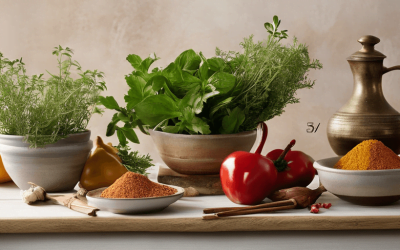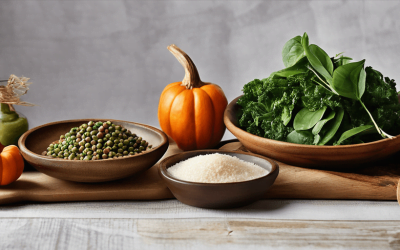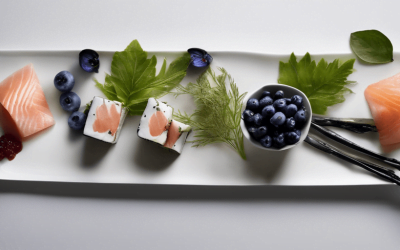Traditional Chinese Medicine (TCM) places great emphasis on the role of herbs, green tea, raw foods, and tofu in promoting overall health. In Traditional Chinese Medicine (TCM), herbs are viewed as a form of medicine with specific healing properties. Raw foods, rich in nutrition, can be incorporated into meals for added health benefits. With this holistic approach in mind, certain foods such as herbal medicine, herbs, tofu, and organ meats have been identified as the top 10 healthy foods in TCM due to their beneficial effects on the body. These carefully selected whole grains, beans, and reishi are nourishing and balancing for the body’s energy systems. By incorporating these food choices, such as herbs and organ meats, into your diet, you can support your overall well-being and promote healing according to the principles of TCM.
- TCM Approach to Healthy Eating
- Beans and Vegetarianism in TCM: Celery and Dry Bean Curd
- TCM Herbs and Superfoods for Health
- Enhancing Digestive Function with TCM-Friendly Foods
- List of the Top 10 healthy foods in TCM
- Choosing Hormone-Free Animal Protein in TCM: Non-GMO and Hormone Free
- Aligning Diet with Seasons: Eating According to TCM
TCM Approach to Healthy Eating
Balancing Yin and Yang Energies
In Traditional Chinese Medicine (TCM), the focus is on achieving balance between yin and yang energies through diet, which includes incorporating herbs and tea. Proper food choices can help maintain jing, the essence of life. This holistic approach emphasizes the importance of eating a variety of whole, unprocessed foods, including herbs, for optimal health. Incorporating these herbs into your dishes can provide natural medicine benefits. Additionally, it is important to consider any dietary restrictions, such as dairy, when preparing meals. By understanding the energetic properties of different foods and herbs, TCM practitioners believe that we can support our overall well-being. This includes incorporating herbs into our diet or using them to make tea. These herbs have been used for centuries in traditional medicine, such as TCM, to promote health and balance the body’s jing energy.
Mindful Eating and Listening to Your Body
One key aspect of Traditional Chinese Medicine’s (TCM) approach to healthy eating is mindful consumption of tea, herbs, jing, and medicine. This means paying close attention to our body’s needs for medicine and herbs and listening to its signals. Tea practitioners can help with this. Instead of mindlessly consuming food, Traditional Chinese Medicine (TCM) practitioners encourage us to be present at the moment while eating, savoring each bite, and being aware of how it makes us feel. This practice helps us connect with the healing power of herbs and the restoration of jing, a vital energy in TCM medicine.
Food Choices for Overall Health
TCM provides guidelines for making food choices that promote balance and harmony within the body, including incorporating tea, herbs, and jing into one’s diet as medicine. It suggests incorporating a wide range of fruits, vegetables, whole grains, lean proteins, healthy fats, and herbs into our meals. Additionally, including tea in our diet can also be beneficial for overall health. These nutrient-dense herbs provide essential vitamins, minerals, and antioxidants that support overall health. Incorporating them into your diet or using them in medicine or tea can be beneficial.
Medical Advice from TCM Practitioners
For individuals with specific health concerns such as diabetes or high blood pressure, seeking guidance from a qualified TCM practitioner can be beneficial in managing their health through the use of medicine, herbs, and food. These practitioners can offer personalized dietary recommendations based on an individual’s unique constitution and medical history in the field of medicine, food, and herbs. By following the principles of TCM’s approach to healthy eating, individuals may experience improvements in their overall well-being by addressing imbalances within the body through the consumption of nutritious food and incorporating the healing properties of herbs as medicine.
Beans and Vegetarianism in TCM: Celery and Dry Bean Curd
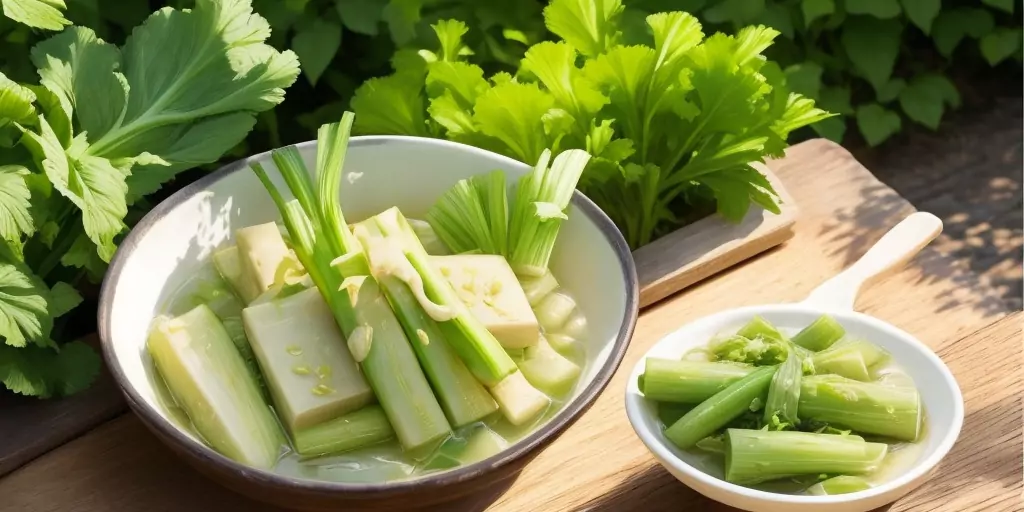 Celery and dry bean curd, also known as tofu skin, are two healthy herbs in Traditional Chinese Medicine (TCM) that offer unique benefits. According to TCM principles, celery is considered a cooling herb that helps clear heat from the body. It is used as a medicine in traditional Chinese medicine (TCM) and has been found to have numerous health benefits. On the other hand, dry bean curd is rich in protein and often used as a meat substitute in vegetarian dishes within TCM. It is a versatile ingredient that can be incorporated into various dishes, providing both nourishment and flavor. In traditional Chinese medicine (TCM), herbs are commonly used to enhance the health benefits of food. Dry bean curd, with its high protein content, is considered a valuable ingredient that can support overall well-being. Whether used in soups, stir-fries, or even marinated and grilled, this plant-based alternative offers a satisfying and nutritious option for those seeking to incorporate more It is a versatile ingredient that can be incorporated into various dishes, providing both nourishment and flavor. In traditional Chinese medicine (TCM), herbs are commonly used to enhance the health benefits of food. Dry bean curd, with its high protein content, is considered a valuable ingredient that can support overall well-being. Whether used in soups, stir-fries, or even marinated and grilled, this plant-based alternative offers a satisfying and nutritious option for those seeking to incorporate more
Celery and dry bean curd, also known as tofu skin, are two healthy herbs in Traditional Chinese Medicine (TCM) that offer unique benefits. According to TCM principles, celery is considered a cooling herb that helps clear heat from the body. It is used as a medicine in traditional Chinese medicine (TCM) and has been found to have numerous health benefits. On the other hand, dry bean curd is rich in protein and often used as a meat substitute in vegetarian dishes within TCM. It is a versatile ingredient that can be incorporated into various dishes, providing both nourishment and flavor. In traditional Chinese medicine (TCM), herbs are commonly used to enhance the health benefits of food. Dry bean curd, with its high protein content, is considered a valuable ingredient that can support overall well-being. Whether used in soups, stir-fries, or even marinated and grilled, this plant-based alternative offers a satisfying and nutritious option for those seeking to incorporate more It is a versatile ingredient that can be incorporated into various dishes, providing both nourishment and flavor. In traditional Chinese medicine (TCM), herbs are commonly used to enhance the health benefits of food. Dry bean curd, with its high protein content, is considered a valuable ingredient that can support overall well-being. Whether used in soups, stir-fries, or even marinated and grilled, this plant-based alternative offers a satisfying and nutritious option for those seeking to incorporate more
Celery: A Cooling Food for Heat Clearance
In TCM, celery is valued for its cooling properties. It is believed that ti has the ability to clear heat from the body, making it an ideal ingredient for individuals who may be experiencing excessive internal heat. This makes it a great addition to any food. Celery is a versatile food that can be added to soups or stir-fries to bring a refreshing element to meals while helping balance the body’s temperature.
Dry Bean Curd: A Protein-Rich Meat Substitute
Dry bean curd, commonly known as tofu skin, is a versatile ingredient used extensively in vegetarian cooking within TCM. This food is highly valued for its adaptability and is a staple in many plant-based dishes. This food is highly valued for its adaptability and is a staple in many plant-based dishes. This fermented soy product is a great option for those looking for alternative sources of protein, especially if they want to avoid meat-based proteins such as beef or pork. It is a fantastic choice for those seeking plant-based food options. It can be marinated or stir-fried with vegetables and rice to create flavorful and nutritious food dishes. Both celery and dry bean curd play important roles in TCM cooking due to their specific properties, especially when it comes to preparing food. Celery is a cooling food that helps regulate body temperature by clearing excess heat. Dry bean curd, on the other hand, is a protein-rich option for vegetarians following TCM principles.
TCM Herbs and Superfoods for Health
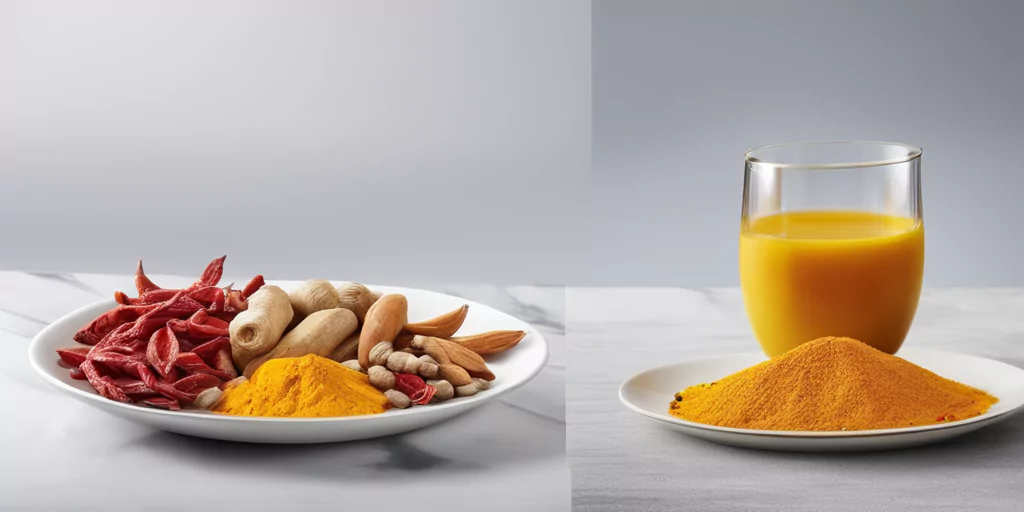 In addition to regular foods, Traditional Chinese Medicine (TCM) emphasizes the use of certain herbs and superfoods to promote health. These food herbs, such as ginseng, goji berries, astragalus root, and turmeric, are believed to possess various medicinal properties.
In addition to regular foods, Traditional Chinese Medicine (TCM) emphasizes the use of certain herbs and superfoods to promote health. These food herbs, such as ginseng, goji berries, astragalus root, and turmeric, are believed to possess various medicinal properties.
- Ginseng: This powerful food herb is highly regarded in TCM for its ability to boost energy levels, improve mental clarity, and strengthen the immune system.
- Goji Berries: Known as a “superfood,” goji berries are packed with antioxidants that help protect against cell damage. They are also believed to support eye health and boost the immune system by providing essential nutrients found in food.
- Astragalus Root: Widely used in TCM for its immune-boosting properties, astragalus root is believed to enhance vitality and protect against stress-related illnesses. This powerful food is known for its ability to boost the immune system and promote overall well-being. This powerful food is known for its ability to boost the immune system and promote overall well-being.
- Turmeric: With its vibrant yellow color and distinct flavor, turmeric has long been used in TCM for its anti-inflammatory properties. This powerful food is known for its anti-inflammatory properties. This powerful food is known for its anti-inflammatory properties. It is known that food promotes digestion and supports joint health.
By incorporating these food herbs into your diet, you can tap into the additional health benefits offered by traditional Chinese wisdom. Here are a few ways you can include them:
- Brew a cup of herbal tea using ginseng or astragalus root for a nourishing and healthy food option.
- Add goji berries to your food. Include them in your smoothies or sprinkle them over yogurt or oatmeal.
- Use turmeric powder in curries or golden milk recipes.
Remember that while these herbs have been used for centuries in TCM, it’s essential to consult with a healthcare professional before making any significant changes to your food diet or incorporating new food supplements.
Enhancing Digestive Function with TCM-Friendly Foods
According to the principles of Traditional Chinese Medicine (TCM), maintaining good digestive function is crucial for overall well-being, especially when it comes to food. TCM emphasizes the importance of healthy food choices and a well-functioning digestive system in promoting optimal health and preventing various food-related ailments. Incorporating certain foods into your diet can help improve digestion and support better gut health, as per traditional Chinese practices.
Ginger: A Digestion-Friendly Spice
Ginger, a popular food, has long been used in Traditional Chinese Medicine (TCM) to aid digestion. Its natural compounds can stimulate the production of digestive enzymes, helping to break down food more efficiently. Adding ginger to your meals or drinking ginger tea can be beneficial for those experiencing digestive issues.
Peppermint Tea: Soothing and Calming
Peppermint tea is another TCM-friendly option that can aid digestion. It has been traditionally used to relieve indigestion, bloating, and stomach discomfort. The menthol in peppermint helps relax the muscles of the gastrointestinal tract, promoting smoother digestion.
Papaya: Enzyme-Rich Fruit
Papaya contains an enzyme called papain that aids in protein digestion. This tropical fruit can help alleviate symptoms of indigestion and support a healthy gut environment. Enjoying fresh papaya as part of your breakfast or incorporating it into smoothies can provide digestive benefits.
Fermented Vegetables: Gut-Boosting Powerhouses
Fermented vegetables like sauerkraut and kimchi are rich in probiotics, which are beneficial bacteria that promote a healthy gut microbiome. These fermented foods can enhance digestion by supporting the growth of good bacteria in the intestines. Including these TCM-friendly foods in your diet may help improve your digestive function and overall gut health. Experiment with different dishes, flavors, and cooking methods to find what works best for you.
List of the Top 10 healthy foods in TCM
- Celery: A cooling herb that helps clear heat from the body
- Dry bean curd (tofu skin): A protein-rich meat substitute in vegetarian dishes
- Ginseng: Boosts energy levels, improves mental clarity, and strengthens the immune system
- Goji berries: Packed with antioxidants, support eye health and boost the immune system
- Astragalus root: Enhances vitality, protects against stress-related illnesses, and boosts the immune system
- Turmeric: Anti-inflammatory properties, promotes digestion, and supports joint health
- Ginger: Stimulates digestive enzymes and aids in digestion
- Peppermint tea: Relieves indigestion, bloating, and stomach discomfort
- Papaya: Contains papain enzyme for protein digestion and supports a healthy gut environment
- Fermented vegetables (sauerkraut and kimchi): Rich in probiotics, promotes a healthy gut microbiome
Choosing Hormone-Free Animal Protein in TCM: Non-GMO and Hormone Free
In Traditional Chinese Medicine (TCM), the quality of animal protein is paramount for maintaining a balanced yin-yang energy in the body. TCM emphasizes the importance of consuming high-quality animal protein that is free from hormones and genetically modified organisms (GMOs). To ensure the highest quality, it is recommended to source hormone-free meat, poultry, and seafood from trusted sources. Here’s why:
Maintaining Yin-Yang Balance
Opting for hormone-free animal protein aligns with TCM principles by promoting a harmonious balance between yin and yang energies within the body. Consuming meats or seafood that are free from hormones helps to prevent any disruptions in this delicate equilibrium.
Ensuring Reproductive Health
Hormones present in commercial produce such as meat and dairy products can have an impact on reproductive health. By choosing hormone-free options, individuals can support their reproductive system’s well-being and maintain hormonal balance naturally.
Boosting Vitality and Energy
Animal protein plays a crucial role in providing essential amino acids necessary for bodily functions. Opting for hormone-free sources ensures that these amino acids are obtained without any interference from artificial substances. This helps to enhance overall vitality, boost energy levels, and support various bodily processes.
Supporting Blood Health
Iron is an important nutrient found in animal protein that contributes to healthy blood production. By selecting hormone-free meats, poultry, or seafood, individuals can ensure they are obtaining iron without any additional synthetic compounds that may negatively affect blood health. Choosing hormone-free animal protein options such as organ meats, deer antler, or whole foods like pork or fish not only supports overall well-being but also aligns with TCM principles of maintaining a balanced yin-yang energy in the body.
Aligning Diet with Seasons: Eating According to TCM
 By understanding the principles of TCM, we can make informed choices about our diet and enhance our overall well-being. We discussed various aspects of healthy eating in TCM, including the importance of beans and vegetarianism, TCM herbs and superfoods for health, enhancing digestive function with TCM-friendly foods, and choosing hormone-free animal protein. By following the principles of TCM. People can optimize their health by nourishing their bodies in a balanced way. The seasonal approach to eating not only supports physical health but also helps maintain harmony within the body. As you embark on your journey towards a healthier lifestyle rooted in TCM principles, consider consulting with a qualified practitioner who can provide personalized guidance based on your unique needs.
By understanding the principles of TCM, we can make informed choices about our diet and enhance our overall well-being. We discussed various aspects of healthy eating in TCM, including the importance of beans and vegetarianism, TCM herbs and superfoods for health, enhancing digestive function with TCM-friendly foods, and choosing hormone-free animal protein. By following the principles of TCM. People can optimize their health by nourishing their bodies in a balanced way. The seasonal approach to eating not only supports physical health but also helps maintain harmony within the body. As you embark on your journey towards a healthier lifestyle rooted in TCM principles, consider consulting with a qualified practitioner who can provide personalized guidance based on your unique needs.
FAQs
Can I still consume meat while following a TCM-inspired diet?
While TCM encourages a predominantly plant-based diet, moderate consumption of high-quality animal protein is not entirely discouraged. Opt for hormone-free and non-GMO sources of animal protein that are aligned with TCM principles.
Are there specific fruits or vegetables recommended during different seasons?
Yes, according to TCM, certain fruits and vegetables are more beneficial during specific seasons due to their energetic properties. For example, cooling fruits like watermelon are ideal for summer months while warming root vegetables like sweet potatoes are suitable for colder seasons.
Can I incorporate modern dietary trends into a TCM-inspired diet?
Absolutely! While staying true to the core principles of TCM, you can adapt modern dietary trends such as gluten-free or dairy-free options to suit your individual needs within the framework of traditional Chinese medicine.
How long does it take to see results from following a TCM-inspired diet?
The time it takes to see results may vary depending on individual factors such as current health status and adherence to the principles of TCM. Consistency is key, and over time, you may start experiencing improvements in your overall well-being.
Is TCM-inspired diet suitable for everyone?
TCM-inspired diet can be beneficial for most individuals looking to improve their health and well-being. However, it is always advisable to consult with a qualified healthcare professional or TCM practitioner before making any significant dietary changes, especially if you have specific health conditions or concerns.




